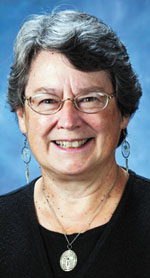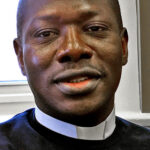By Corinne Winter
Next week’s liturgy draws us into the Paschal mystery, the central mystery of our faith. Of course, every Eucharist makes us present to that mystery, to the events of Jesus’ saving life, death and resurrection. However, Holy Week liturgies provide a particular focus on the passion, death and resurrection. Those events give shape to the Christian life, so during Holy Week, and especially during the Easter Triduum, we long to be transformed in the image of Christ, to become more faithful disciples.

During the Palm Sunday Mass, we experience a kind of shock wave as Jesus is greeted with “all glory, laud and honor,” but soon after is betrayed and crucified. The reading from Philippians reminds us that Jesus’ obedience unto death is the cause of his exultation. Still, it is hard to grasp. Something in me wants to reject the connection.
During this past year, we have experienced threats to our lives from the pandemic and threats to our way of life from political turmoil. We know that we face some hard work as we seek to address many issues that have come to light. Reflecting on the passion of Jesus, we see that God does not send suffering either as punishment or as a test. Rather, God is with us in our sorrow and pain, taking them into God’s own life. God alone can bring life out of death. May we be open to God’s presence with us and attuned to the work of the Spirit among us so that we become willing to take up the difficult tasks of working to build a just society according to the values of God’s reign.
The Holy Triduum takes us through the dramatic climax of Jesus’ mission. We hear the command to take and eat bread, to take and drink wine in his memory, receiving in them Jesus himself as nourishment for our journey. That commandment is accompanied by the exhortation to imitate Christ in love and service to others as illustrated by Jesus’ washing of his disciples’ feet and carried to its ultimate end in his death on the cross. The words of the liturgy are stirring. “Can you not wait one hour with me?” “One of you will betray me.” “You will deny me.” “Crucify him!” “Father, into your hands I commend my Spirit.” Finally, “He is not here. He is risen.”
Numerous filmmakers have been drawn to portray the moving history. As we pray, we are moved not only by an account of past events but also by their continuing presence in the world. Christ continues to suffer in victims of injustice in our world. If we imagine ourselves wanting to wait that one hour with Christ, we should desire also to wait with those who suffer today. That includes people of color who have to teach their children how to face threats in situations that would not be threatening to white people. It includes immigrants waiting months and years in squalid living conditions to seek a better life in another country. It includes those who have lost loved ones to illness or to violence.
Pope Francis has shown during his recent travels, and in actions and words throughout his papacy, some of the places where our loving service is needed. He has visited victims of war and persecution even when many see his visits as risky. He has washed the feet of those in prison. He loves to reach out to those along his path whose need or pain is most obvious. Our opportunities to serve directly have been somewhat limited during this pandemic, yet we are called to reach out as we can, according to our means and abilities. The petitions made during the Good Friday service call us to broaden our concerns and outreach.
The liturgy of the Triduum calls us from darkness into light. It calls us to repentance, to faithful discipleship, to hope and to joy. We hear of the first witnesses to Jesus’ resurrection. We may be inclined to think their experiences would have been marked by unmitigated joy. Yet the accounts suggest that they also experienced uncertainty and confusion.
Finally, as they come to believe, even without full comprehension, they recognize that the Good News is not for them alone; they must share it, even with gentiles, with those who are not like themselves. As the liturgical year goes on, we will be reminded that they took up the mission of Christ, even at great cost to themselves. May we be inspired to do likewise.
(Corinne Winter is a professor-emerita of St. Ambrose University, Davenport.)











